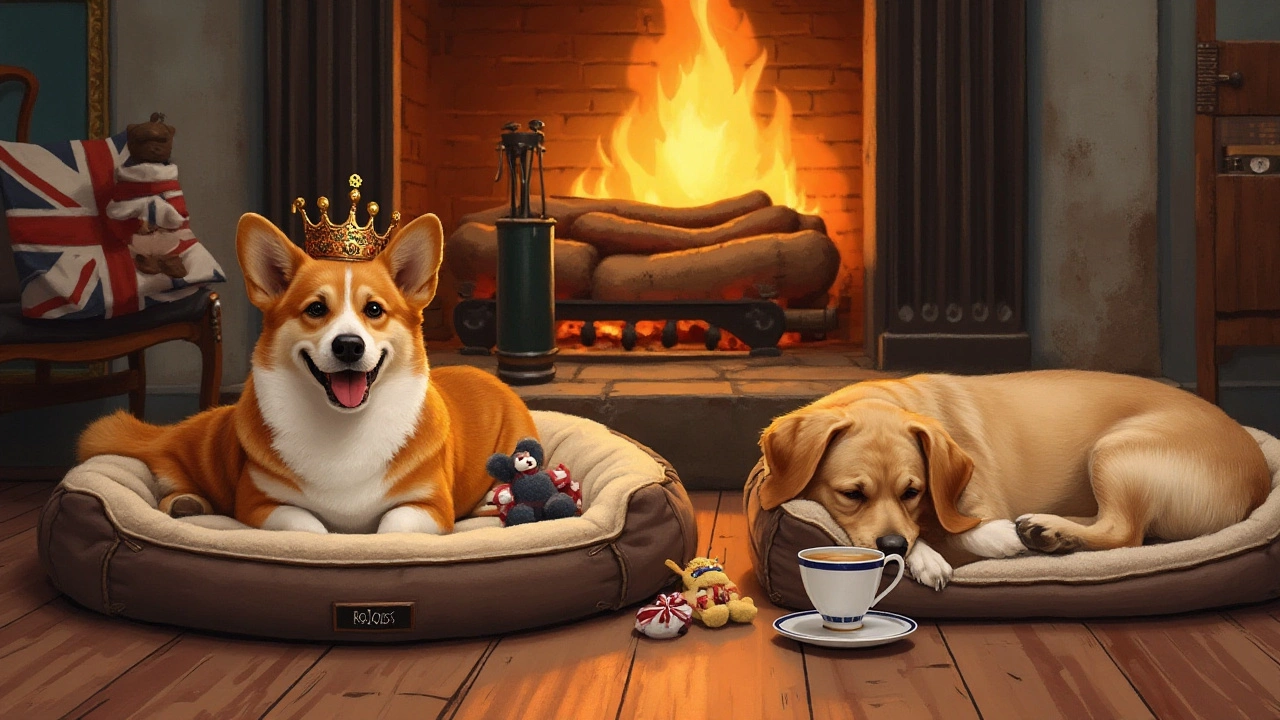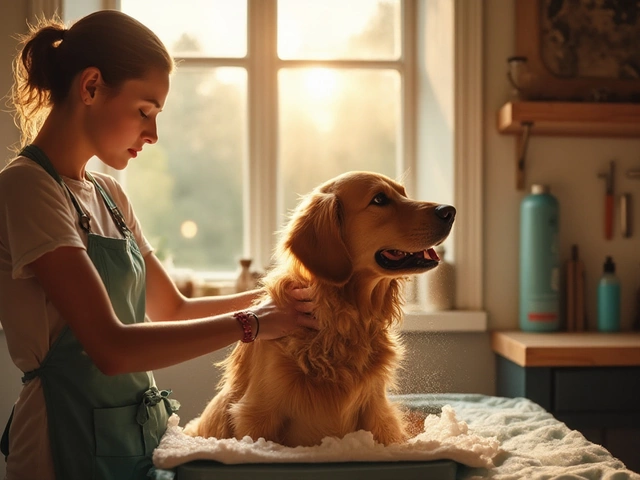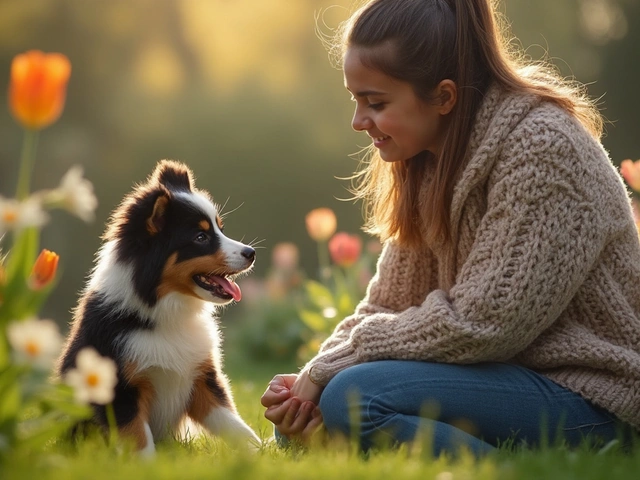Imagine spending a night tossing and turning on an uncomfortable bed. Now, think about our four-legged companions. Do dogs face similar dilemmas when it comes to their sleeping spaces? The design of a dog bed might seem trivial to the uninitiated, yet picking between a round or rectangular shape can significantly impact your pet's quality of rest.
Dogs, much like humans, have their unique sleep styles. Some curl up in tight circles, almost imitating a cinnamon roll, while others prefer to sprawl out like a starfish across as much surface area as possible. If you've ever paused to consider whether your dog prefers one shape of bed over the other, this article is your invitation into the fascinating psychology of canine comfort.
- Understanding Dog Sleep Styles
- The Case for Round Beds
- Why Rectangular Beds Work
- Evaluating Your Dog's Preferences
- Making the Right Choice
Understanding Dog Sleep Styles
Dogs, much like their human counterparts, exhibit unique sleeping patterns that can give us insight into their comfort preferences and emotional states. Understanding these behaviors not only helps in selecting the best dog beds but also enriches the bond between you and your furry friend.
Curled Up Sleepers
Many dogs prefer to sleep curled up in a tight ball, a behavior inherited from their wild ancestors who needed to conserve body heat and protect vital organs from predators. This position is common among smaller breeds or those that naturally seek warmth and security. For these dogs, a round bed may mimic the natural curves they create, offering a cozy embrace.
Laid-Back Loungers
Then there are the laid-back loungers—dogs that stretch fully with abandon, occupying as much space as possible. Breeds like Greyhounds and larger dogs tend to favor this position. A rectangle bed allows them to sprawl without limitations, which could contribute to a more restful and relaxed sleep.
Back Sleepers
Some dogs lie on their backs with their paws in the air. This posture reveals trust and comfort in their environment, as it leaves them in a vulnerable position. A supportive, well-padded bed, regardless of shape, may cater to their needs as it supports their entire body weight comfortably.
Factors Influencing Sleep Style
- Age and Health: Puppies and older dogs have different sleep demands. A senior dog with arthritis may need memory foam support that accommodates their favorite sleeping style.
- Breed Traits: Bulldog breeds, with their compact builds, might naturally prefer curling up, while Labrador Retrievers might enjoy sprawling over a ledge.
- Environmental Comfort: A quiet room with a consistent temperature often allows dogs to sleep more soundly, influencing their posture and bed preferences.
| Sleep Style | Ideal Bed Shape |
|---|---|
| Curled Up | Round |
| Sprawlers | Rectangle |
| Back Sleepers | Any supportive |
By observing your dog's rest habits and coupling this knowledge with insights into pet comfort and bed designs, selecting the ideal snoozing solution becomes less of a guessing game and more of a tailored approach to canine happiness.
The Case for Round Beds
For dog beds, round shapes are not just an aesthetic choice—they align closely with the natural instincts of many canines. Dogs often curl up in tight balls while they sleep, a behavior that stems from their days in the wild when they had to conserve body heat and protect vital organs from predators. This inherent inclination makes the round dog bed a fitting choice for many pets, offering a snug and secure environment.
One of the most compelling benefits of a round bed is the psychological comfort it provides. The defined edges give a sense of boundary and containment, which can be extremely reassuring for dogs, especially those who suffer from anxiety. The raised sides tend to mimic a den-like structure, lending a cozy feel that is reminiscent of the natural shelters they might seek out in the wild.
Benefits of Round Beds
- Enhanced Security: The circular design can offer a cradle-like effect, making dogs feel safe, similar to the experience of cubs in their nest.
- Heat Retention: The form encourages dogs to curl up, which naturally aids in heat conservation and provides a warm sleeping spot especially crucial during chilly nights.
- Space Utilization: Typically, round beds fit neatly into corners or small spaces, making them ideal for small apartments or rooms.
Recent surveys suggest that breeds known for their curling sleep positions, such as Dachshunds, Terriers, and Chihuahuas, show a marked preference for round dog beds. This isn't just due to anatomical considerations but also a behavioral tendency towards curling as it ties into their comfort zones.
Choosing the Right Round Bed
While opting for a round bed, it's essential to consider the dimensions to ensure your dog doesn't feel cramped. Check for adequate padding for orthopedic support, especially for older or larger breeds where joint health might be a concern. Material is another critical factor—look for hypoallergenic, washable fabrics that are comfortable yet durable.
In addition to comfort, the cleaning aspect is vital in a pet comfort choice. Many round beds come with removable covers that can be easily washed, keeping the bed fresh and clean, which in turn helps avoid the build-up of allergens that could affect your pet.
Ultimately, the allure of a round bed lies in its ability to offer a distinctive and instinctual comfort level to dogs that prefer to curl up. For those with a penchant for burrowing, these beds can become a sanctuary of peace and warmth.
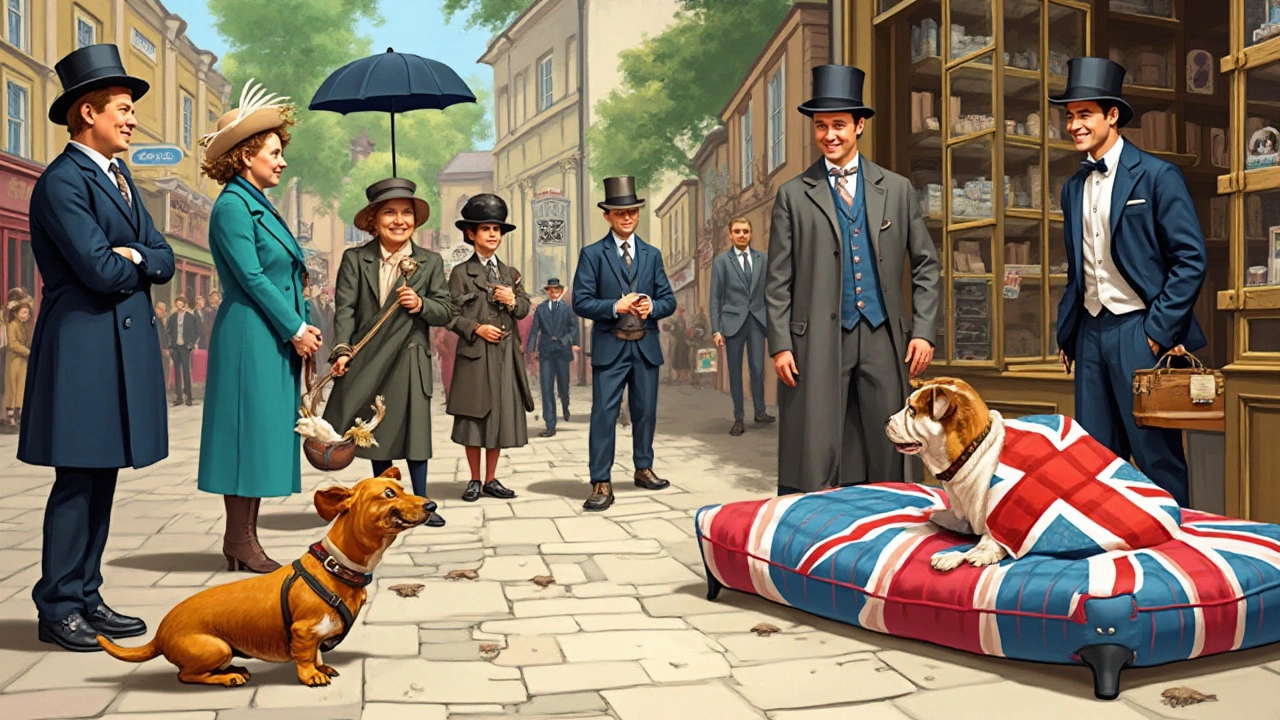
Why Rectangular Beds Work
For many dogs, a rectangular bed isn't just a place to rest; it's a canvas for their sleep artistry. Unlike their circular counterparts, rectangular beds offer space that encourages sprawling, and for dogs who love stretching out, they might feel like the most liberating option.
Rectangular beds provide great versatility and space, accommodating various breeds, including those with larger frames such as Labradors, German Shepherds, or even the majestic Great Dane. Such breeds often prefer the luxury of stretching out their limbs entirely, and a rectangular bed offers just the right amount of space for an effortless, comfortable sprawl.
Benefits of Rectangular Beds
The advantages of rectangular beds extend beyond mere space. Here are some compelling reasons why you might opt for one:
- Space Efficiency: Placing a rectangular bed in a room can sometimes offer better utilization of space, often fitting snugly against walls or in room corners.
- Human-like Comfort: Mimicking human beds, rectangular shapes might offer dogs a familiar feel, especially for those who enjoy lying beside their humans.
- Room to Share: Perfect for households with multiple pets, these beds can easily accommodate two or more small to medium-sized dogs, encouraging social snuggles.
Perfect for Pets with Joint Concerns
A noticeable lifestyle benefit of rectangular beds is their suitability for dogs with joint or mobility issues. Many come equipped with orthopedic padding that aligns with the elongated shape of the bed. This thoughtful design helps reduce the strain on joints, providing more even support across the dog's body.
Catering to Sleeping Habits
While dog preferences can be as unique as their personalities, a dog's sleep style plays a crucial role in determining the ideal bed type. Dogs who favor a curled-up posture might still enjoy a rectangular bed's flexibility, as it allows them to switch postures with ease and comfort.
Emphasizing rectangular bed's multi-functional use, let us also consider its adaptability in travel scenarios. They're easy to fit in the backseat of cars, ensuring your pup stays comfortable on road trips or while navigating unfamiliar hotel rooms. These beds indeed embrace an unrivaled aspect of utility.
In the quest to understand whether a round or rectangle bed better suits your dog, consider these aspects of their daily life and sleep preferences. When personalized to a pet's needs, rectangular beds might just be the perfect fit for a restful pup.
Evaluating Your Dog's Preferences
Determining whether your dog prefers a round or rectangle dog bed can feel like a guessing game, but observing your dog's natural behaviors can offer valuable clues. Dogs have instinctual habits that manifest in their sleep styles, and these can guide you toward the perfect bed shape that complements their unique needs.
Observe Your Dog's Sleeping Habits
Start by paying close attention to how your dog naturally sleeps. Dogs that curl up tightly often seek comfort, warmth, and security, which typically aligns with the enclosed feel of a round bed. Conversely, if your dog likes to stretch out, a rectangular bed usually provides the space they crave.
The Dynamics of Sleep Preferences
In a 2022 study by the Canine Sleep Institute, it was noted that approximately 60% of dogs exhibited a preference for sleeping positions that mimicked their daytime activity levels. Active, high-energy dogs often favor the sprawling positions accommodated by rectangle beds, while calmer, more sedentary dogs tend to coil up, making round beds more appealing.
A Practical Test
Before committing to a purchase, consider conducting a simple experiment. Provide both a round and rectangular bed in your home and monitor which one your dog chooses over a week. Make sure both options are equally comfortable, avoiding any bias that may skew your observations.
The Role of Bed Location
Surprisingly, the location of the bed can also affect your dog’s preference. Placing a round bed in a corner might appeal to a dog that values security, whereas placing a rectangle bed in an open, central area might attract a more sociable or watchful pup.
Tune into your dog's reactions when trying different shapes in diverse environments. A dog that seems constantly restless might benefit from a slight change in the bed's location, rather than its design.
Customization and Flexibility
Sometimes, the solution lies in versatility. Some beds on the market come with modular features, allowing owners to adjust the bed's shape according to their pet's evolving preferences. This can be especially beneficial if your dog's sleeping habits change with the seasons or age.
Remember, like humans, dogs might have certain preferences during nighttime versus nap time, so keep an eye out for these nuances.
In summary, choosing between a round or a rectangle bed is less about what's trendy and more about what fits your dog's lifestyle. Your pet's rest should cater to their comfort, security, and the subtle preferences that make them the unique companion you cherish.
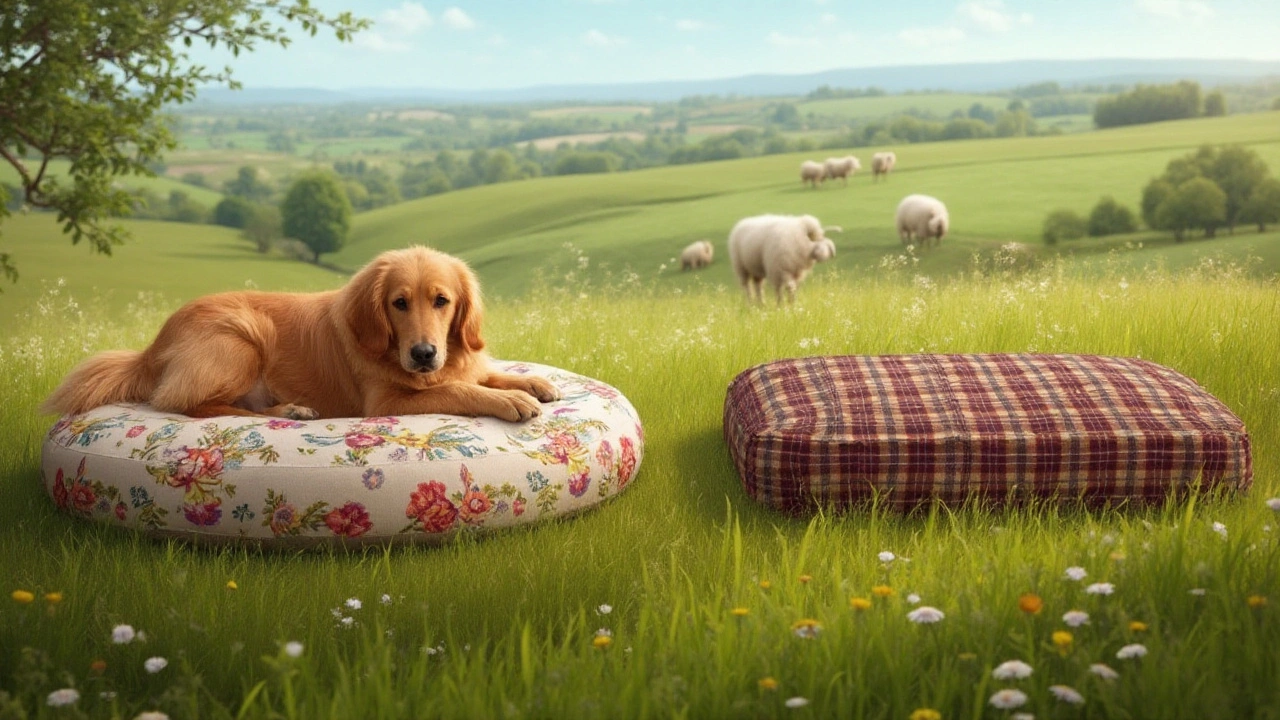
Making the Right Choice
Choosing the perfect dog bed is not just about the aesthetics or what you think would look best in your living room. It's about catering to your pet's unique preferences and sleep needs, which ultimately contribute to their comfort and well-being.
Observing Your Dog's Sleep Habits
To make an informed decision, start by observing your dog's usual sleeping habits. Do they curl up in a ball, suggesting a penchant for round beds that provide a snug, den-like environment? Or do they sprawl across the floor, indicating a need for the expansive real estate that rectangular beds offer?
Consider the Space and Size
Another factor to bear in mind is the space where the bed will be placed and the size of the bed relative to your dog. While a round bed might be cozier for smaller spaces, large breeds might appreciate the roominess of a rectangular bed.
Material and Durability
The choice of materials can also impact comfort and longevity. Beds made from memory foam provide joint support ideal for older dogs, while water-resistant fabrics might be suitable for puppies prone to accidents.
| Feature | Round Bed | Rectangular Bed |
|---|---|---|
| Best For | Curling Sleepers | Sprawlers |
| Ideal Space | Limited Areas | Larger Space |
| Material | Plush, Cozy | Firm, Supportive |
Assessing Your Options
In the end, making the right choice involves some trial and error. Visit pet stores with your dog, if possible, and let them try out different beds. Their preference may surprise you!
With the right bed, you'll be offering your pet a sanctuary where they can rest, recuperate, and dream of chasing squirrels.

